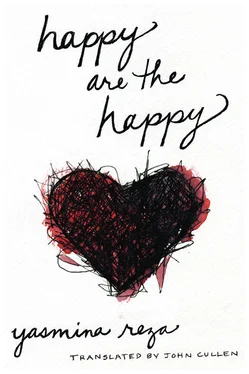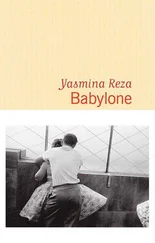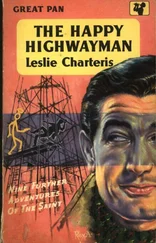Yasmina Reza - Happy Are the Happy
Здесь есть возможность читать онлайн «Yasmina Reza - Happy Are the Happy» весь текст электронной книги совершенно бесплатно (целиком полную версию без сокращений). В некоторых случаях можно слушать аудио, скачать через торрент в формате fb2 и присутствует краткое содержание. Год выпуска: 2015, ISBN: 2015, Издательство: Other Press, Жанр: Современная проза, на английском языке. Описание произведения, (предисловие) а так же отзывы посетителей доступны на портале библиотеки ЛибКат.
- Название:Happy Are the Happy
- Автор:
- Издательство:Other Press
- Жанр:
- Год:2015
- ISBN:978-1-59051-693-5
- Рейтинг книги:4 / 5. Голосов: 1
-
Избранное:Добавить в избранное
- Отзывы:
-
Ваша оценка:
- 80
- 1
- 2
- 3
- 4
- 5
Happy Are the Happy: краткое содержание, описание и аннотация
Предлагаем к чтению аннотацию, описание, краткое содержание или предисловие (зависит от того, что написал сам автор книги «Happy Are the Happy»). Если вы не нашли необходимую информацию о книге — напишите в комментариях, мы постараемся отыскать её.
Schnitzler’s
gives these twenty short chapters their shape while Borges’s poem gives them their content. As we move from story to story, thrilled to reconnect with an old acquaintance from an earlier scene, we can’t help but admit that we are very much at home in this human comedy that understands all too well the passing thoughts, desires, actions, fears, and mistakes that we have and make day after day, but that we would be incapable of rendering with such acuity and compassion.
Happy Are the Happy — читать онлайн бесплатно полную книгу (весь текст) целиком
Ниже представлен текст книги, разбитый по страницам. Система сохранения места последней прочитанной страницы, позволяет с удобством читать онлайн бесплатно книгу «Happy Are the Happy», без необходимости каждый раз заново искать на чём Вы остановились. Поставьте закладку, и сможете в любой момент перейти на страницу, на которой закончили чтение.
Интервал:
Закладка:
Robert Toscano
All of a sudden, as we’re leaving the hospital morgue (known as the Amphitheater) on Rue Bruant, at the moment when the men are shoving Ernest’s coffin into the back of the funeral coach, my mother-in-law Jeannette, seized by some incomprehensible terror, refuses to get into the vehicle. She’s supposed to sit in the front with Marguerite and the funeral director — today called the master of ceremonies — and Odile, my mother, and I are supposed to follow them in the Volkswagen to the crematorium in Père-Lachaise Cemetery. Wearing high-heeled shoes never before seen on her feet, my mother-in-law retreats (nearly falling down as she does) to the wall, like an animal about to be led to the slaughterhouse. With her back pressed against the stone in the dazzling sunlight, she enjoins the driver of the coach, a big Mercedes station wagon, to go on without her, all the while making frenetic, sweeping gestures before the alarmed eyes of Ernest’s sister Marguerite, who’s already installed in the backseat. Maman, Maman, Odile says, if you don’t want to ride with Papa, I’ll go instead. She gently takes Jeannette’s arm to guide her to the Volkswagen, where my mother, wilting in the heat (summer has arrived all at once), is sitting in the front seat, waiting. The director hastens to open the rear door, but Jeannette babbles something that turns out to be, I want to sit in front. Odile whispers, Maman, please, that’s not important. — I want to follow Ernest. That’s my husband in there! If you want me to stay with you, Maman, Marguerite can ride with the coffin by herself, Odile says, giving me a look that means, get your mother to change places. No doubt I fail to react properly, because Odile thrusts her head into the car and says, Zozo, would you be kind enough to sit in the backseat? The idea of getting into the funeral coach is making Maman anxious. My mother looks at me with the expression of a person who believes that she has now seen everything. Without a word, slowly, she unfastens her seat belt, collects her purse, and extracts herself from the front seat, emphasizing the arthritic discomfort of the movements. Thanks, Zozo, Odile says, that’s very generous of you. Still unspeaking, and with the same heaviness in her body language, my mother ensconces herself in the backseat. Jeannette sits in the front without any acknowledgment, and in any case she looks like someone who has no more place in this world. Odile gets into the Mercedes with her aunt and the funeral director. I take the wheel of the Volkswagen and proceed to follow them to Père-Lachaise. After a moment, Jeannette, her face to the windshield and her eyes riveted on the black hatch of the Mercedes, says, was your husband cremated, Zozo? Cremated? my mother repeats. I say incinerate. No, says Jeannette, you use incinerate for household garbage. The things I learn, my mother says. My father’s buried in Bagneux cemetery, I say, intervening. Jeannette seems to ponder this information, and then she turns around and asks my mother, will you have yourself buried with him? Good question, says my mother. If it was up to me, not in this life. I hate that Bagneux. Nobody ever comes to see you. It’s completely in the sticks. In front of us, the Mercedes crawls along at an exasperatingly slow pace. Is that part of the ceremony? We stop at a red light. A vague silence has set in. I’m hot. My tie’s strangling me. The suit I’m wearing is too heavy. Jeannette’s looking for something in her purse. I can’t stand the semimuffled noises, the clinking and the leather-creaking that accompany her rummaging around. All the more so as she’s sighing, and I can’t stand people who sigh either. After a moment, I ask, what are you looking for, Jeannette? — The obituary in Le Monde , I didn’t even have time to look at it. I thrust my right hand into her purse and help her extract the folded, crumpled article. — Can you read it out loud? Jeannette puts on her glasses and reads in a dismal voice: “Ernest Blot Dies. A banker both influential and secretive. Born in 1939, Ernest Blot died in the night of June 23 at the age of seventy-three. His demise marks the passing of a leading figure in French elite banking, one of those whose career began in the civil service and whose savoir-faire was equaled only by his discretion. In 1965, he graduated with top honors from the National School of Administration” — top honors, you see, I’d forgotten about that — “and joined the General Inspection of Finances. Between 1969 and 1978, he was a member of several ministerial cabinets, serving as technical consultant,” et cetera, we know all that … “In 1979, he joined the Wurmster Bank, which had been founded just after the First World War and had since fallen somewhat into obsolescence. He was the bank’s director general until 1985, when he became its chairman and chief executive officer. Little by little, he turned the Wurmster Bank into one of France’s premier institutions, on a par with Lazard Frères or the Rothschild banking houses …” — et cetera — “He was the author of a biography of Achille Fould, Minister of Finance in the Second Republic (Éditions Perrin, 1997). Ernest Blot held the rank of Grand Officer in the National Order of Merit and was a Commander in the Legion of Honor …” Not a word about his wife, Jeannette observes. Is that the usual procedure? As for the Achille Fould, I never once opened it. It sold three copies. I feel nauseous after reading all that. My mother says, it’s stifling in this car, will you turn up the AC, darling? No AC! Jeannette screams, no AC, it makes my head throb. I look at the rearview mirror. So as not to contradict the widow of the day, my mother has rearranged herself by simply throwing back her head and opening her mouth like a carp out of water. Jeannette reaches into her purse again and pulls out a battery-operated pocket fan with transparent blades. — Here, Zozo, this will cool you off. She turns it on. It makes a sound like a maddened wasp. Jeannette describes two circles around her own face and holds out the fan to my mother. — Try it, Zozo, it really works. — No, thanks. — Take it, Maman, you’re hot. — I’m fine, stop bugging me. Jeannette makes another little pass with the fan from one side of her neck to the other. In a cavernous voice right behind my ear, my mother says, I still blame your father for not selling that pathetic burial plot. When I die, Robert, have us moved. Put us in the city. Paulette told me there are still some places in the Jewish section in Montparnasse cemetery. The Mercedes turns left, describing a kind of majestic circle and fleetingly revealing the mute profiles of Odile and Marguerite. Jeannette says, I don’t feel anything at all. She seems lost. Her arms are at her sides, her open purse on her lap, the buzzing fan in one inert hand. I feel I should reply to her, make some comment, but nothing comes to me. Ernest occupied an important place in my life. He was interested in my work (I’d read certain articles to him before submitting them to the newspaper). He’d question me and dispute with me the way I would have liked my own father to do (my father was kind and affectionate, but he didn’t know how to be a grown man’s father). We’d call each other almost every morning to fix Syria and Iran and criticize Western naïveté and European conceit. That was his hobbyhorse: the fact that now, after a thousand years of massacres, we have license to lecture everybody else. I’ve lost a friend who had a vision of existence. That’s pretty rare. People don’t have a vision of existence. They have nothing but opinions. To speak with Ernest was to be less alone. I know their day-to-day marriage couldn’t have been much fun for Jeannette. One day — Ernest was leaving for a monetary conference — she threw a cup of coffee at his head. You’re a vile character, she said, you’ve wrecked my life as a woman. Ernest, who was wiping coffee off his suit jacket, replied, your life as a woman? What’s that, a life as a woman? After I met Odile, he told me, I give you fair warning, she’s a pain in the ass, I’ll thank you if you take her off my hands. And later he said, don’t worry, my boy, the first marriage is always hard. I asked him, have you been married more than once? — No, that’s just it. I hear my mother talking in the backseat. It takes me a couple of moments to come back from my thoughts and understand her words. She’s saying, it’s afterward that you feel something, when all the pomp and fuss of death is over. When the pomp and fuss is over, Jeannette says, I’ll feel nothing but resentment. You’re exaggerating, I say. She shakes her head and asks, was he a good husband, yours, Zozo? Ooohh … says my mother. — What are you trying to say, Maman? You were happy with Papa, weren’t you? — I wasn’t unhappy. That wasn’t it. But you know, good husbands are few and far between. We drive along Avenue Gambetta in silence. The trees cast swaying shadows. Jeannette has started digging in her purse again. A driver on my left blows his horn. The car pulls even with us and I’m on the verge of replying with some insult when I recognize the Hutners’ smiling (in the proper funeral manner) faces. Lionel’s driving. Pascaline’s leaning out of the window and making hand signals to Jeannette. I glance briefly at the rear of their car. Before I accelerate, I have time to notice their son Jacob sitting in the backseat, grave and ramrod-straight, with some kind of Indian scarf wrapped around his neck. You invited the Hutners? Jeannette asks in a crushed voice. — We invited our closest friends. The Hutners were very fond of Ernest. — Oh my God, it kills me to talk to all these people, all this kills me. This society gathering. For this crappy cremation. She pulls down the sun visor with the mirror and checks her face. As she’s putting on lipstick, she says, you know who I invited? Raoul Barnèche. — Who’s that? — There’s something none of you knows, not even Odile, something that won’t appear in any newspaper. I had to put up with it on my own. When Ernest came home from his bypass surgery in 2002, he fell into a black hole and stayed there. He was down, morning and night, prostrated in the big chair under the unicorn painting, picking at his food, refusing to do any therapy. He thought he was through. Albert, his chauffeur, had the idea of introducing his brother to Ernest. His brother’s Raoul Barnèche, a champion card player. And a handsome man, as you’ll see, a Robert Mitchum type. He started coming over almost every day to play gin rummy with Ernest. They played for money. The stakes got higher and higher. That brought Ernest back to life. I had to call a halt before he got completely taken to the cleaners. But the cards saved him. We turn into the cemetery from Rue des Rondeaux, on the side where the funerary chapel is. The Mercedes comes to a stop in front of the Neo-Byzantine crematorium. There are people on the steps and among the columns. I share Jeannette’s anxiety. Odile and Marguerite are already standing outside the car. A man dressed in black points me to the parking area on the left. I say to the women, do you want to get out here first? They both say no and I understand why. I park the car. We walk along the side of the building. Odile comes to meet her mother. She says, there are more than a hundred people here, and the chapel doors are still closed. I notice Paola Suares, the Condamines, the Hutners, Marguerite’s children, and Doctor Ayoun, to whose office I accompanied Ernest on several occasions. I see Jean Ehrenfried climb up the steps one by one, supported by Darius Ardashir, who’s also carrying Jean’s crutch. A little apart, near a bush, I recognize Albert, my late father-in-law’s chauffeur. Jeannette smiles at the man he’s with, a fellow wearing mafioso sunglasses. The two of them come over to us. Albert puts his arms around my mother-in-law. When he releases her, his eyes are damp and his face seems to have shrunk. He says, twenty-seven years. Jeannette repeats the number. I ask myself if Jeannette is aware of how much Albert could have seen and hidden from her in the course of those twenty-seven years. She turns toward the other man. He’s dark-haired, wearing a corduroy jacket. Jeannette takes his hand and says, it was so kind of you to come, Raoul. The man takes off his sunglasses and says, I was moved, sincerely moved. Jeannette doesn’t release his hand. She gives it a series of little shakes. He lets her, though he’s somewhat embarrassed. She says, Raoul Barnèche. He and Ernest used to play gin rummy together. It’s true, I think, there’s something Robert Mitchum — like about him. His dimpled chin, his sleepy eyes, his wayward hair. Jeannette’s rosy all over. He smiles. In the area in front of the crematorium, under a uniformly blue sky, while family, friends, and officials wait for her, my mother-in-law stubbornly clings to this man whose name I’ve never heard before. I sense movement around us. Through the columns, I see the doors of the chapel open. I look for my mother, who has vanished. I spot her standing with the Hutners at the foot of the steps and go over to her. Odile joins us. She kisses Jacob warmly and says, I haven’t seen you for so long, have you grown since the last time? In a thin voice and with a pronounced Québécois accent, Jacob says, Odile, you know I lost my father too, of course it’s been very difficult, but I’ve made a place for him at the bottom of my heart. He places his hands on his chest and adds, I know he’s here with me. Odile gives me a bewildered look. I bat my eyelids soothingly and form the words I’ll explain later with my lips. I step next to Lionel, whose face has turned to stone, take his arm, and set my mother in motion with my other hand. She’s about to make a comment as we go up the steps, but I compel her to refrain by squeezing her arm. The chapel is filling up in silence. I seat my mother and the Hutners and go off to play my role as host among the rows of seats. I greet members of the family, a number of Ernest’s Breton cousins, André Taneux, Ernest’s fellow student at the ENA and the first president of the Court of Auditors, the publisher of my newspaper (whose ridiculous three-day beard Odile approves of), several strangers, the finance minister’s chief of staff, the head of the General Inspection of Finances, and some of Ernest’s former colleagues in the Inspection, who slip spontaneously into the rows. Darius Ardashir introduces me to the president of the Third Circle’s board of governors. I come across Odile again, this time among the staff of the Wurmster Bank. She’s wearing her little power hairdo, her Counselor Toscano look. She’s putting up a brave front. She murmurs into my ear, Jacob?! I don’t have time to reply, because the master of ceremonies asks us to take our seats in the first row, where Marguerite, her children, and Jeannette are already sitting. The company rises. Ernest’s coffin has entered the nave of the chapel. The bearers place the coffin on the trestles at the foot of the steps leading up to the catafalque. The funeral director steps to the lectern. At the top of the double flight of stairs behind him, in the painting that surrounds the platform, a city half Jerusalem and half Babel, with biblical poplars scattered here and there, is bathed in a starry, blue, supremely kitschy twilight. The funeral director proposes a few moments of silence. I imagine Ernest, lying there in his tight Lanvin suit, a leftover from the 1960s that Jeannette chose for the occasion. I’ll be there too one day, I think, I too will stifle in the strongbox of death, completely alone. And so will Odile. And the children. And everybody here, high and low, more or less old, more or less happy, doggedly holding their own in the ranks of the living. And all of them completely alone. Ernest wore that suit for years. Even when it had completely gone out of fashion, even when his belly should have put anything double-breasted out of the question. While driving himself home from Brussels one day, zooming along at 110 miles per hour, Ernest ate a bag of barbecue-flavored potato chips, a chicken sandwich, and a nougat bar. Less than five minutes later, he turned into a cane toad, suffocated by his Lanvin suit and his seat belt. His car was a Peugeot convertible, and as he was entering Paris, a pigeon shit on him. I look for the Hutners. They’ve moved to the end of their row, just in front of the Condamines. Jacob’s on the very end. Looking humble and reserved, I notice, like a person who doesn’t wish to attract attention. André Taneux has replaced the master of ceremonies at the lectern. Blow-dried, brushed-back, high-standing hair dyed a radical shade of brown (slightly purple in the diffused light from the stained-glass windows). Odile and Jeannette had been reluctant to let him speak, but he’d seemed quite determined to express himself. He slowly unfolds a sheet of paper, uselessly readjusts the microphone, begins to read: “An imposing silhouette abruptly moves away, leaving in its wake a scent of Gauloises and aristocracy. Ernest Blot has left us. If I come here today to make my voice heard — thank you so much for your permission, Jeannette — it’s because with the passing of Ernest Blot, we haven’t simply lost a loved one. We’ve lost a happy moment in our history. In the immediate postwar years, with much of France in ruins, there unexpectedly arose a party capable of reuniting people of all backgrounds and all convictions, believers and atheists, left and right: the party of modernization. Its necessary task was, at one and the same time, to reconstruct both the State and the fabric of enterprise, to build up savings again and place them in the service of growth. Our friend Ernest Blot was one of the emblematic figures in that party. ENA, Inspection of Finances, ministerial cabinets, elite bank: a life lived in a straight, unbroken line, in a period that alas no longer exists, a time when alumni of the National School of Administration were not technocrats but builders, when the State was marked not by conservatism but by progress, when banks meant not the gambling of wild sums of money in a globalized casino but the stubborn financing of the productive base. It was a period when men of talent dedicated themselves not to making their career or their fortune but to serving their country, in public and private, without venality and without vanity. I feel deep sorrow at having lost Ernest, but I console myself with the thought that a great gentleman has left a world that no longer resembles him. Rest in peace, my friend, remote from a time unworthy of you.” And you’d better hurry back to the hair colorist, I say just for Odile to hear. Taneux refolds his sheet of paper, clamps his lips together in grief, and returns to his seat. The funeral director waits for the echo of his footsteps on the marble floor to subside. The director lets another moment pass and then announces, Monsieur Jean Ehrenfried, administrator and business executive, formerly chairman of the board of Safranz-Ulm Electric. Darius Ardashir is leaning over Jean to help him rise to his feet and support himself on his crutch. With cautious, limping steps, Jean moves toward the lectern. He’s thin and pale, wearing a checked beige suit and a tie with yellow polka dots. He puts his free hand on the top of the lectern to assure his balance. The wood creaks and resounds. Jean looks at the coffin and then turns his eyes to the assembly. He takes out no sheet of paper, puts on no eyeglasses. “Ernest … you used to ask me, what in the world can I say about you at your funeral? And I’d reply, you’re going to sing the praises of an old, stateless Jew, try to say something with some depth for once in your life. I was older than you, and sicker, we didn’t anticipate that the situation would be reversed … We spoke regularly on the telephone. The phrase that kept being repeated was, where are you? Where are you? Our work took us to many disparate places, but you had Plou-Gouzan L’Ic, your house near Saint-Brieuc. You had your house and your apple trees, in a little valley. When I said, where are you, and you answered, at Plou-Gouzan L’Ic, I would envy you. You really were somewhere. You had forty apple trees. You produced one hundred and twenty liters of cider per year, frightful stuff I eventually came around to thinking was good …” He stops talking. He sways and holds on to the lectern. The funeral director seems to want to intervene, but Jean prevents him and goes on. “It was, to use your own words, a hard, rough cider, put up in plastic bottles with detergent bottle caps, a far cry from the corked, fizzy ciders of the bourgeoisie. It was your cider. It came from your apples, from your land … Where are you now? Where are you? I know your body’s in this casket, six feet away. But you, where are you? Not long ago, in my doctor’s waiting room, one of his other patients said this: After a while, even life is an idiotic value. It’s true that at the end of the road, you fluctuate between the temptation to oppose death energetically — I recently bought a stationary bicycle — and the desire to let yourself slide down into the dark, unknown place … Are you waiting for me somewhere, Ernest …? Where …?” This last word might not be what he says. It’s barely audible and could just as well be the first syllable of an unfinished phrase. Jean falls silent. In several tiny stages, careful to dissemble his physical weakness, he turns almost entirely toward the coffin. His lips open and close like a famished bird’s beak. His right hand firmly clasps his crutch, and he sways on its pivot. He remains in this precarious position for a long time, murmuring, as it were, into the dead man’s ear. Then he looks over in Darius’s direction. Darius immediately comes to help him return to his seat. I squeeze Odile’s hand, and I see that she’s crying. The director, back at the microphone, announces that Ernest Blot’s coffin will now be transferred for cremation, which, he adds, is in accordance with the wishes expressed by Monsieur Blot himself. The bearers raise the coffin again. They climb the stairs in silence and reach the catafalque, which looks ridiculously high and far away. A mechanism goes into operation. Ernest disappears.
Читать дальшеИнтервал:
Закладка:
Похожие книги на «Happy Are the Happy»
Представляем Вашему вниманию похожие книги на «Happy Are the Happy» списком для выбора. Мы отобрали схожую по названию и смыслу литературу в надежде предоставить читателям больше вариантов отыскать новые, интересные, ещё непрочитанные произведения.
Обсуждение, отзывы о книге «Happy Are the Happy» и просто собственные мнения читателей. Оставьте ваши комментарии, напишите, что Вы думаете о произведении, его смысле или главных героях. Укажите что конкретно понравилось, а что нет, и почему Вы так считаете.












